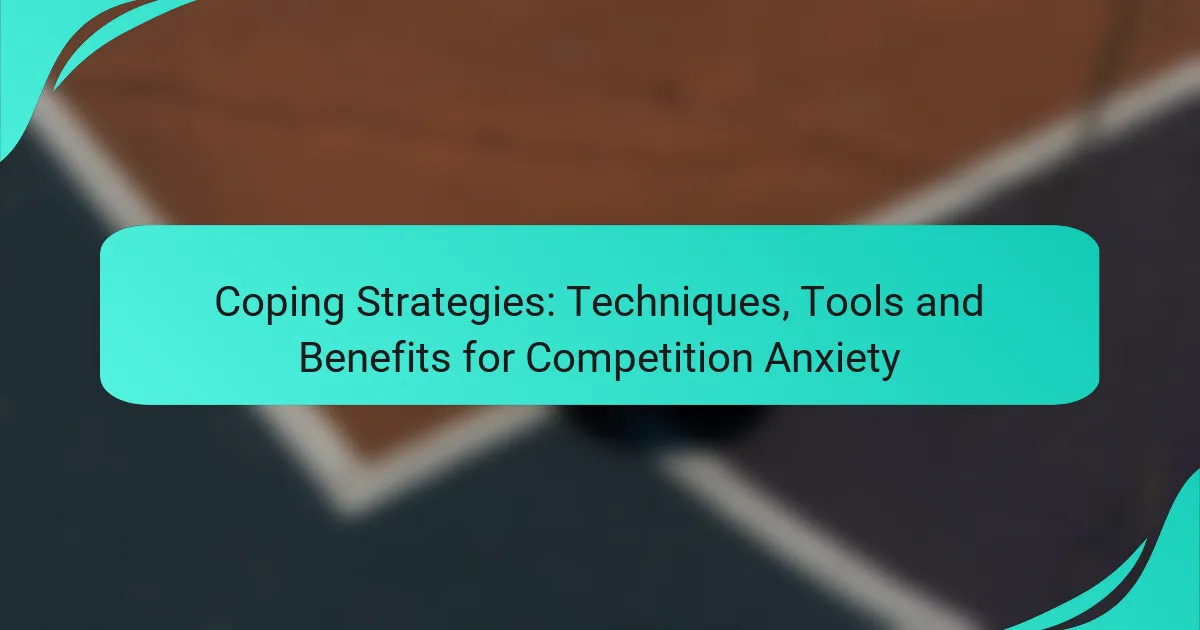Competition anxiety can be a significant barrier to optimal performance, but effective coping strategies can help individuals manage stress and enhance focus. By utilizing various techniques and tools, such as technology-driven resources, competitors can track their mental state and access support, ultimately promoting a calm mindset. Implementing these strategies not only reduces nervousness but also empowers athletes to perform at their best during high-pressure situations.
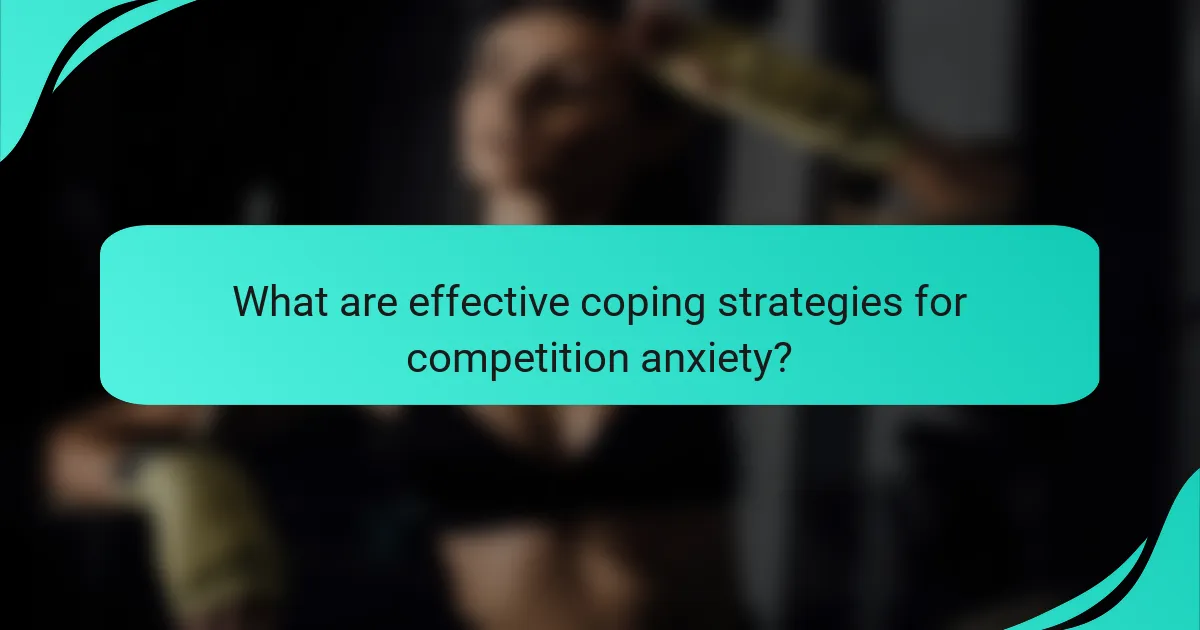
What are effective coping strategies for competition anxiety?
Effective coping strategies for competition anxiety include techniques that help manage stress and improve focus. These methods can enhance performance by reducing nervousness and promoting a calm mindset.
Mindfulness meditation
Mindfulness meditation involves focusing on the present moment, which can help reduce anxiety during competitions. Practicing mindfulness for just a few minutes daily can enhance awareness and promote relaxation.
To get started, find a quiet space, sit comfortably, and concentrate on your breath. If your mind wanders, gently bring your focus back to your breathing. Aim for sessions lasting 5-15 minutes, gradually increasing as you become more comfortable.
Cognitive behavioral techniques
Cognitive behavioral techniques (CBT) address negative thought patterns that contribute to competition anxiety. By identifying and challenging these thoughts, you can develop a more positive mindset.
Consider keeping a journal to track anxious thoughts and replace them with constructive affirmations. For example, instead of thinking, “I will fail,” reframe it to, “I am prepared and capable.” This shift can significantly reduce anxiety levels.
Visualization practices
Visualization practices involve mentally rehearsing successful performance scenarios, which can boost confidence and reduce anxiety. By vividly imagining yourself succeeding, you create a positive mental framework for actual competition.
Spend a few minutes each day visualizing key moments of your performance, focusing on details like your movements and emotions. This technique can help solidify your skills and reduce pre-competition jitters.
Breathing exercises
Breathing exercises are effective for calming the nervous system and managing anxiety. Techniques like deep breathing can lower heart rates and promote relaxation before and during competitions.
Try the 4-7-8 technique: inhale through your nose for 4 seconds, hold your breath for 7 seconds, and exhale through your mouth for 8 seconds. Repeat this cycle a few times to help regain composure.
Physical activity
Engaging in physical activity can significantly alleviate competition anxiety by releasing endorphins and improving mood. Regular exercise helps reduce stress levels and increases overall well-being.
Incorporate activities you enjoy, such as running, swimming, or team sports, into your routine. Aim for at least 150 minutes of moderate exercise weekly to reap the benefits for both mental and physical health.
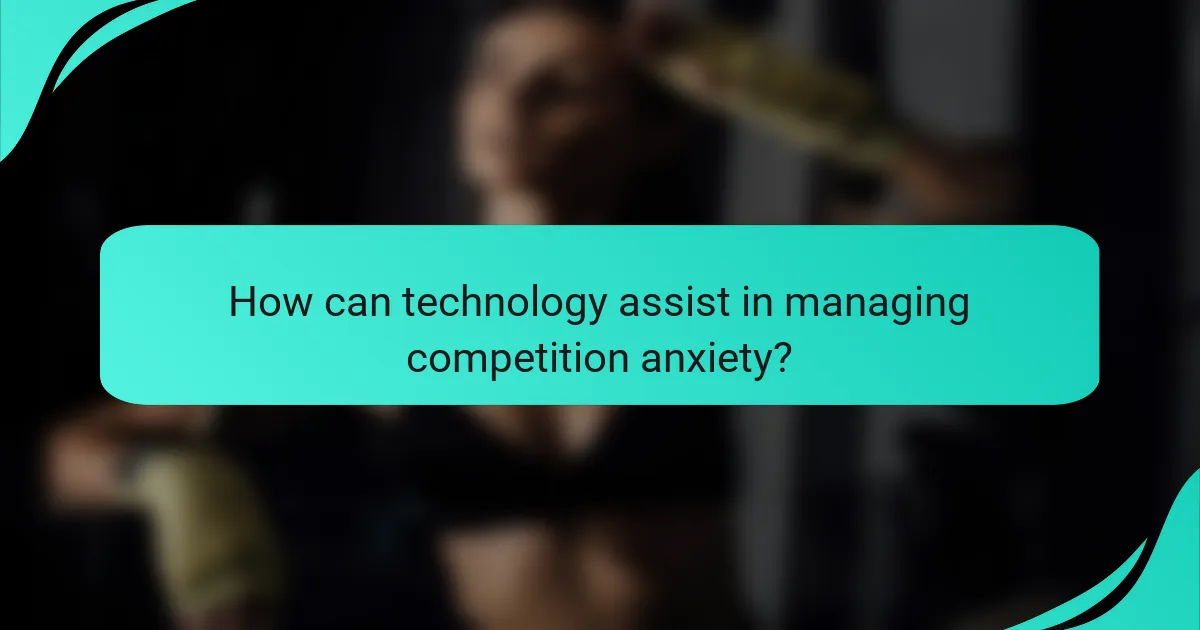
How can technology assist in managing competition anxiety?
Technology can play a significant role in managing competition anxiety by providing tools and resources that help individuals track their mental state, access support, and develop coping strategies. Various applications and devices are designed to monitor stress levels, offer therapeutic guidance, and facilitate communication with mental health professionals.
Mental health apps
Mental health apps are designed to help users manage anxiety through guided exercises, mood tracking, and relaxation techniques. Popular options include Headspace and Calm, which offer meditation and mindfulness practices tailored to reduce stress before competitions. Many of these apps are available for free or through a subscription model, making them accessible to a wide audience.
When choosing a mental health app, consider features such as user reviews, ease of use, and the variety of techniques offered. Look for apps that provide personalized plans or progress tracking to enhance your experience and effectiveness.
Wearable stress monitors
Wearable stress monitors, such as smartwatches and fitness trackers, can help individuals keep track of physiological indicators of stress, like heart rate and sleep patterns. Devices from brands like Fitbit and Garmin often include features that alert users to elevated stress levels, prompting them to engage in calming activities. These monitors can provide real-time feedback, allowing users to adjust their behavior during competition preparation.
When using wearable technology, ensure that you regularly check and interpret the data to understand your stress triggers. Setting reminders to practice relaxation techniques based on your monitor’s feedback can help maintain a balanced mental state.
Online therapy platforms
Online therapy platforms, such as BetterHelp and Talkspace, connect individuals with licensed therapists through video, chat, or messaging. These services offer flexibility and convenience, allowing users to seek help from the comfort of their homes, which can be particularly beneficial for those facing competition anxiety. Many platforms provide options for different budgets, including subscription plans and pay-per-session models.
When selecting an online therapy platform, consider factors like therapist qualifications, session availability, and user reviews. It’s crucial to find a therapist who understands competition-related anxiety and can provide tailored strategies to manage it effectively.
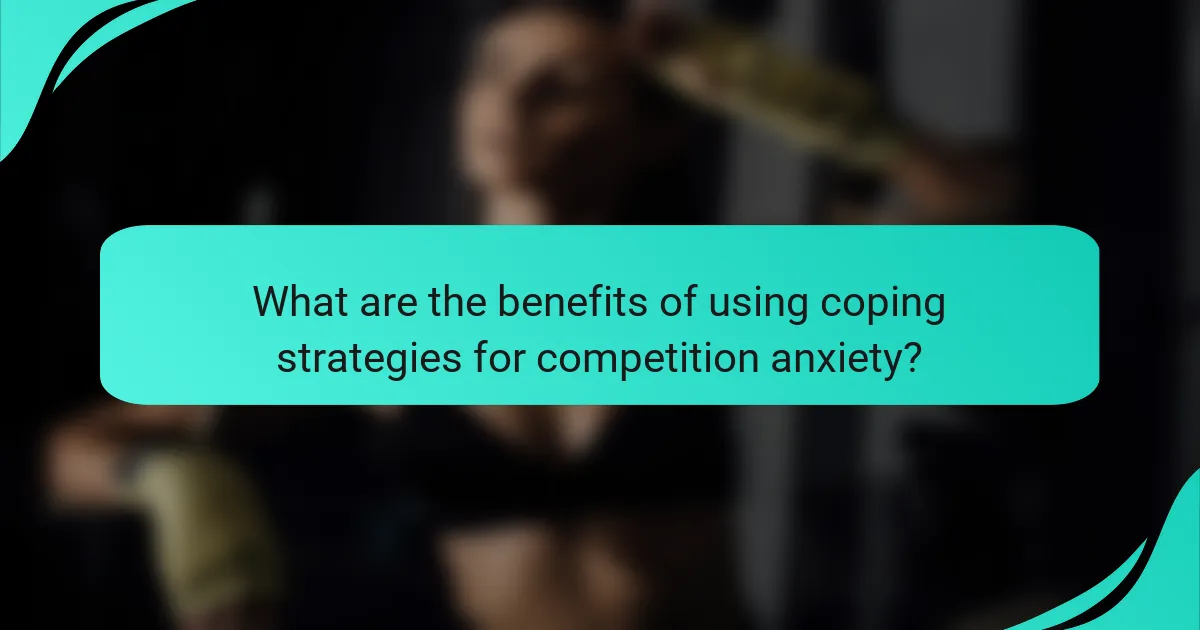
What are the benefits of using coping strategies for competition anxiety?
Coping strategies for competition anxiety can significantly enhance an individual’s ability to manage stress and improve overall performance. By employing these techniques, athletes and competitors can focus better, perform at their peak, and reduce feelings of anxiety during high-pressure situations.
Improved focus
Utilizing coping strategies helps sharpen concentration, allowing competitors to direct their attention towards the task at hand. Techniques such as mindfulness meditation or visualization can create a mental environment conducive to focus, minimizing distractions from external pressures.
For instance, athletes might practice deep breathing exercises before a competition to center their thoughts and eliminate noise. This enhanced focus can lead to better decision-making and execution during critical moments.
Enhanced performance
Coping strategies can lead to improved performance by fostering a positive mindset and reducing anxiety-related impairments. When competitors feel in control and calm, they are more likely to execute their skills effectively and confidently.
Examples include setting realistic goals and breaking tasks into manageable steps, which can help maintain motivation and clarity. Regular practice of these strategies can lead to consistent performance improvements over time.
Reduced stress levels
Implementing coping strategies is effective in lowering stress levels associated with competition. Techniques like progressive muscle relaxation or journaling can help individuals process their feelings and reduce tension before events.
Creating a routine that incorporates these strategies can lead to long-term benefits, such as decreased anxiety and a more enjoyable competitive experience. Regularly engaging in these practices can help competitors build resilience against future stressors.
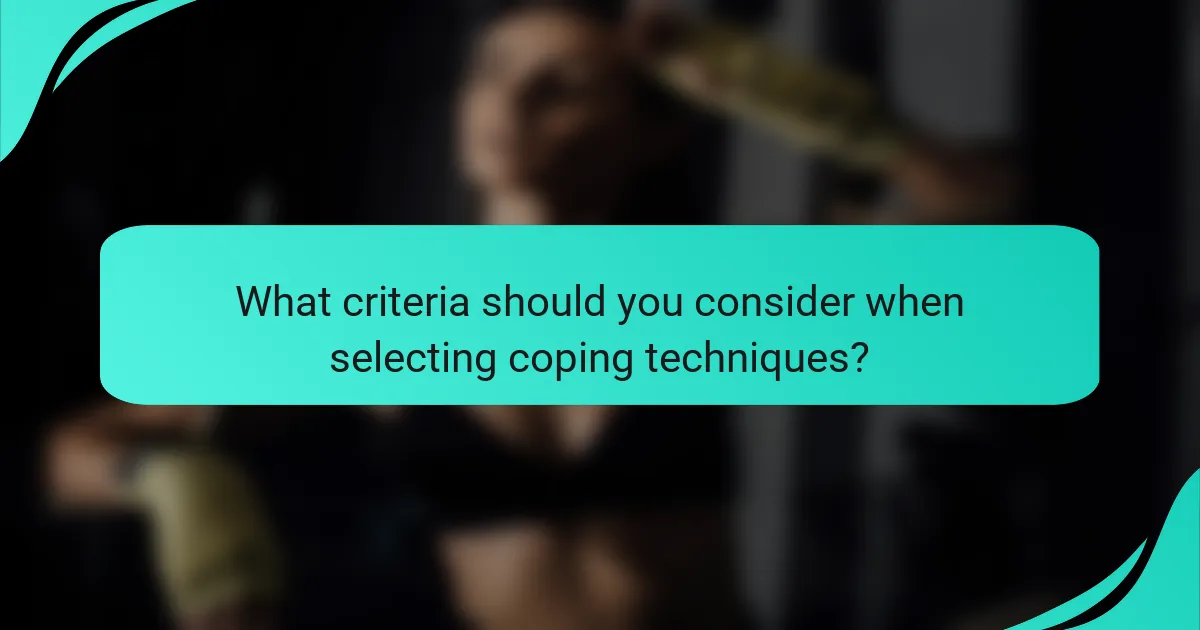
What criteria should you consider when selecting coping techniques?
When selecting coping techniques for competition anxiety, consider personal preferences, effectiveness for specific situations, and accessibility of resources. These criteria help ensure that the chosen strategies are suitable, practical, and easy to implement when needed.
Personal preferences
Your personal preferences play a crucial role in determining which coping techniques will be most effective for you. Techniques that align with your interests and comfort levels are more likely to be adopted consistently. For instance, if you enjoy physical activity, incorporating exercise as a coping strategy may be beneficial.
Consider experimenting with various techniques, such as mindfulness, visualization, or breathing exercises, to discover what resonates with you. Keeping a journal can also help track your feelings and preferences over time, guiding you to the most effective strategies.
Effectiveness for specific situations
Different coping techniques may work better in specific competitive scenarios. For example, deep breathing exercises can be effective for immediate anxiety relief before a performance, while long-term strategies like regular meditation may help build resilience over time. Assess the context of your competition to choose the most appropriate method.
It’s helpful to create a mental toolkit of techniques tailored to various situations. For instance, if you struggle with pre-competition jitters, practice visualization techniques to mentally rehearse success. This targeted approach can enhance your performance and reduce anxiety.
Accessibility of resources
Accessibility of resources is vital when selecting coping techniques for competition anxiety. Ensure that the methods you choose can be easily integrated into your routine and that you have the necessary tools available. For example, if you opt for guided meditation, ensure you have access to a reliable app or online resource.
Evaluate whether you can practice your chosen techniques anywhere, such as at home, in the locker room, or during travel. Techniques that require minimal equipment or preparation, like breathing exercises, are often more practical in high-pressure situations. Prioritize strategies that fit seamlessly into your lifestyle for the best results.
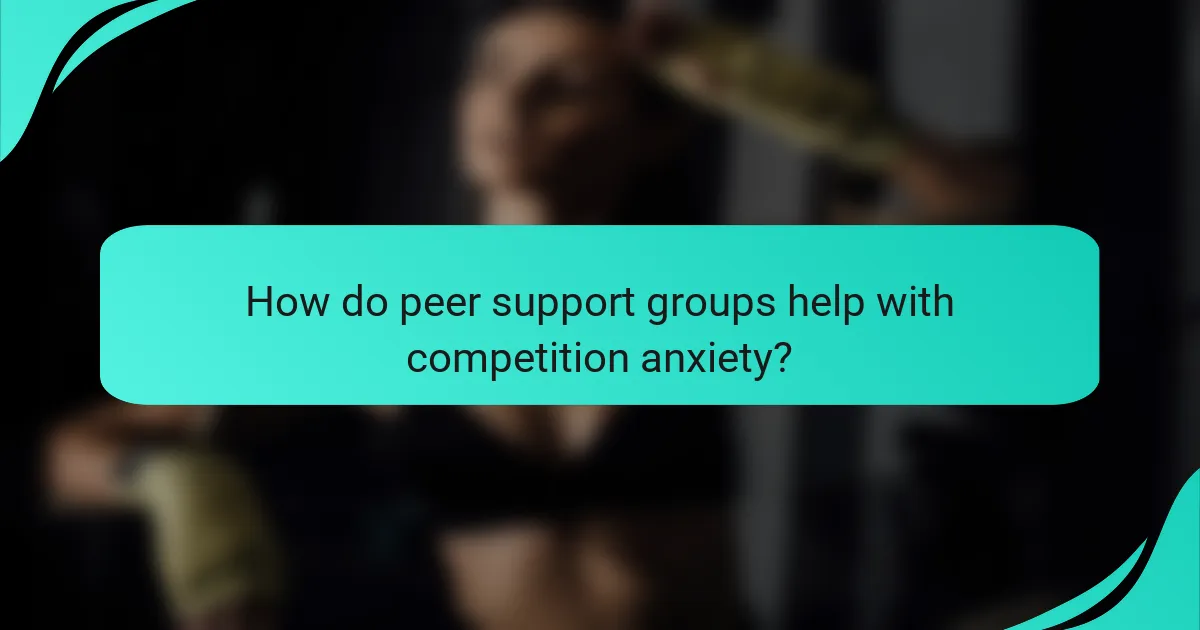
How do peer support groups help with competition anxiety?
Peer support groups provide a platform for individuals experiencing competition anxiety to share their feelings and coping strategies. These groups foster a sense of community and understanding, which can significantly alleviate stress and promote resilience.
Shared experiences
Shared experiences in peer support groups create a safe space where members can openly discuss their competition-related anxieties. Hearing others articulate similar fears can validate personal feelings and reduce the sense of isolation often associated with anxiety.
Members can exchange practical tips and coping mechanisms that have worked for them, such as visualization techniques or breathing exercises. This exchange not only enhances individual strategies but also builds a collective knowledge base that everyone can benefit from.
Additionally, these groups often encourage accountability, where members check in on each other’s progress and provide support during high-pressure situations, such as competitions or performances. This communal support can be a powerful motivator to face challenges head-on.
